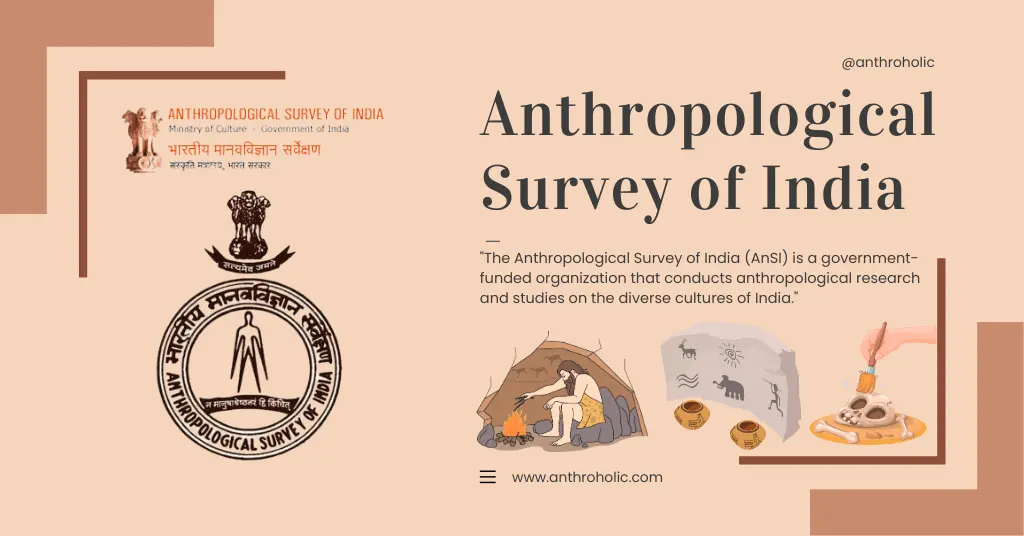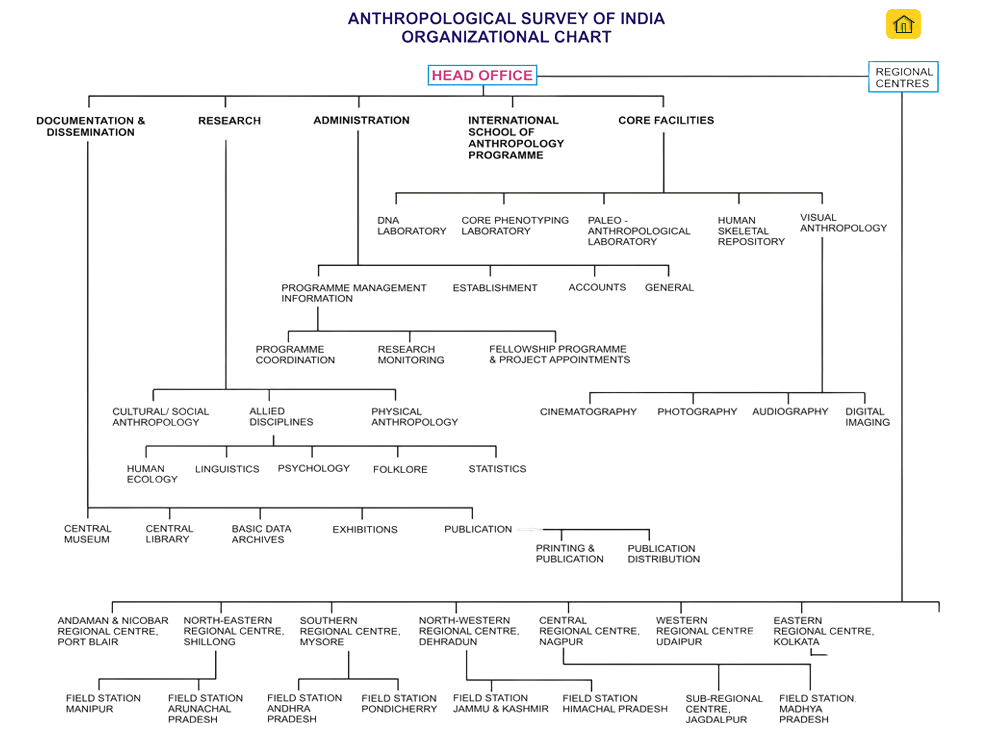AI Answer Evaluation Platform Live Now. Try Free Answer Evaluation Now
Anthropological Survey of India

Anthropological Survey of India (AnSI). Established in 1945, AnSI is a premier organization that conducts anthropological research and studies on the diverse cultures of India. In this comprehensive guide, we will take you through the history, significance, methodology, key findings, contribution, challenges, collaborations, future prospects, and impact of AnSI on Indian society.[1] AnSI is recognized as one of the premier research institutes for anthropological research in bio-cultural studies. [2]

| Abbreviation | AnSI |
| Formation | 1945 |
| Headquarters | Kolkata (West Bengal |
| Parent Organization | Ministry of Culture Gover of India |
| Website | https://ansi.gov.in |
Introduction to the Anthropological Survey of India (AnSI)
The Anthropological Survey of India (AnSI) is a government-funded organization that conducts anthropological research and studies on the diverse cultures of India. AnSI was established in 1945 with the aim of studying the tribes and castes of India and their way of life. Since then, AnSI has expanded its research ambit to include the study of the entire gamut of Indian society, including the rural and urban population, the marginalized sections, and the diaspora.
AnSI has several branches located in different parts of India, including Delhi, Lucknow, Shillong, and Pune. [3]. AnSI has a multidisciplinary team of anthropologists, sociologists, linguists, archaeologists, and other allied professionals who conduct research and studies on various aspects of Indian society. AnSI’s research findings are published in its various publications, including the Journal of Anthropological Survey of India, Occasional Papers, and Monographs.
History of AnSI and its Significance
AnSI was established in 1945 under the leadership of Dr. S.C. Roy, a renowned anthropologist. AnSI was initially set up to study the tribes and castes of India and their way of life. AnSI’s early research focused on collecting ethnographic data on the different tribes and castes of India, including their social structure, kinship system, religious beliefs, and economic activities.
Over the years, AnSI has expanded its research ambit to include the study of the entire gamut of Indian society. AnSI has played a significant role in preserving India’s cultural heritage by documenting and studying the various cultural practices, traditions, and customs of different communities. AnSI’s research has also helped in highlighting the diversity and richness of Indian culture.

The Role of AnSI in Preserving India’s Cultural Heritage
AnSI’s role in preserving India’s cultural heritage cannot be overstated. AnSI has documented and studied various cultural practices, traditions, and customs of different communities across India. AnSI’s research has helped in highlighting the diversity and richness of Indian culture.

AnSI has also played a significant role in promoting and preserving the languages of India. AnSI has documented and studied various languages spoken across India, including endangered languages. AnSI’s research has helped in developing scripts and dictionaries for these languages and promoting their use.
AnSI has also been instrumental in preserving India’s archaeological heritage. AnSI has conducted extensive research and studies on Indian archaeology, including excavations and surveys of various archaeological sites. AnSI’s research has helped in reconstructing the history and culture of ancient India.
The Methodology of Conducting AnSI Research
AnSI’s research methodology is based on the principles of anthropological research. AnSI’s research is primarily based on fieldwork and participant observation. AnSI’s researchers spend extended periods of time in the field, living with the communities they study, and observing their way of life.
AnSI’s research is also based on the collection of ethnographic data. AnSI’s researchers collect data on various aspects of the community’s life, including their social structure, kinship system, religious beliefs, and economic activities. AnSI’s researchers also collect data on the community’s history, traditions, and customs.
AnSI’s research methodology also includes the use of various tools and techniques, including surveys, interviews, and questionnaires. AnSI’s researchers also use audiovisual and photographic documentation to supplement their research.
Principle Objectives of AnSI
- To research the tribes and other groups that make up India’s population from a biological and cultural perspective.
- To examine and conserve human skeletal remains from both contemporary and archaic times.
- To gather examples of Indian tribal arts and crafts.
- To serve as a training ground for management and advanced anthropology students.
- To publish the research’s findings.
Key Findings of AnSI Research
AnSI’s research has yielded several key findings that have contributed significantly to our understanding of Indian society. AnSI’s research has highlighted the diversity and richness of Indian culture and has documented various cultural practices, traditions, and customs of different communities.
AnSI’s research has also highlighted the challenges and issues faced by various communities, including the marginalized sections of society. AnSI’s research has helped in developing policies and programs for the upliftment of these communities.
AnSI’s research has also contributed significantly to our understanding of Indian archaeology. AnSI’s research has helped in reconstructing the history and culture of ancient India and has shed light on various aspects of Indian society, including the economy, religion, and social structure.
AnSI’s Contribution to Anthropology and Allied Fields
AnSI’s contribution to anthropology and allied fields is significant. AnSI’s research has contributed to the development of various theories and concepts in anthropology, including the concept of cultural relativity and the study of social structure and kinship systems.
AnSI’s research has also contributed to the development of Indian archaeology. AnSI’s research has helped in developing the methodology for archaeological excavations and surveys in India and has contributed to the development of various theories and concepts in Indian archaeology.
AnSI’s research has also contributed to the development of linguistics. AnSI’s research has documented various languages spoken across India, including endangered languages, and has contributed to the development of scripts and dictionaries for these languages.
Challenges Faced by AnSI in its Operations
AnSI faces several challenges in its operations. One of the significant challenges faced by AnSI is the lack of funding. AnSI’s operations are entirely funded by the government, and there is often a shortage of funds for its various research projects.
AnSI also faces challenges in accessing some of the remote and inaccessible areas of India where many communities live. AnSI’s researchers often have to face various logistical challenges, including lack of transportation, communication, and basic facilities like electricity and water.
AnSI also faces challenges in recruiting and retaining qualified and experienced professionals. Many professionals prefer to work in the private sector, where salaries and benefits are higher than those offered by AnSI.
Collaborations of AnSI with Other Organizations
AnSI has collaborated with several other organizations to carry out its research and studies. AnSI has collaborated with various universities and research institutions in India and abroad. AnSI has also collaborated with various government and non-governmental organizations to carry out its research and studies.
AnSI’s collaborations have helped in sharing resources, expertise, and knowledge, and have contributed significantly to the development of various fields of study.
Future Prospects of AnSI and its Impact on Indian Society
AnSI has a bright future ahead, with several research projects in the pipeline. AnSI’s research is expected to contribute significantly to our understanding of Indian society and culture and to the development of various fields of study.
AnSI’s research is also expected to have a significant impact on Indian society. AnSI’s research has already contributed to the development of policies and programs for the upliftment of marginalized sections of society. AnSI’s research is also expected to contribute to the development of various fields, including healthcare, education, and social welfare.
Conclusion
In conclusion, the Anthropological Survey of India (AnSI) is a premier organization that conducts anthropological research and studies on the diverse cultures of India. AnSI’s research has contributed significantly to our understanding of Indian society and culture and has highlighted the diversity and richness of Indian culture.
AnSI’s role in preserving India’s cultural heritage and promoting the use of Indian languages is significant. AnSI’s research has also contributed to the development of various fields of study, including anthropology, archaeology, and linguistics.
FAQs about AnSI
References
[1] https://museumsofindia.gov.in/repository
[3] https://www.indianculture.gov.in/MoCorganization/anthropological-survey-india



